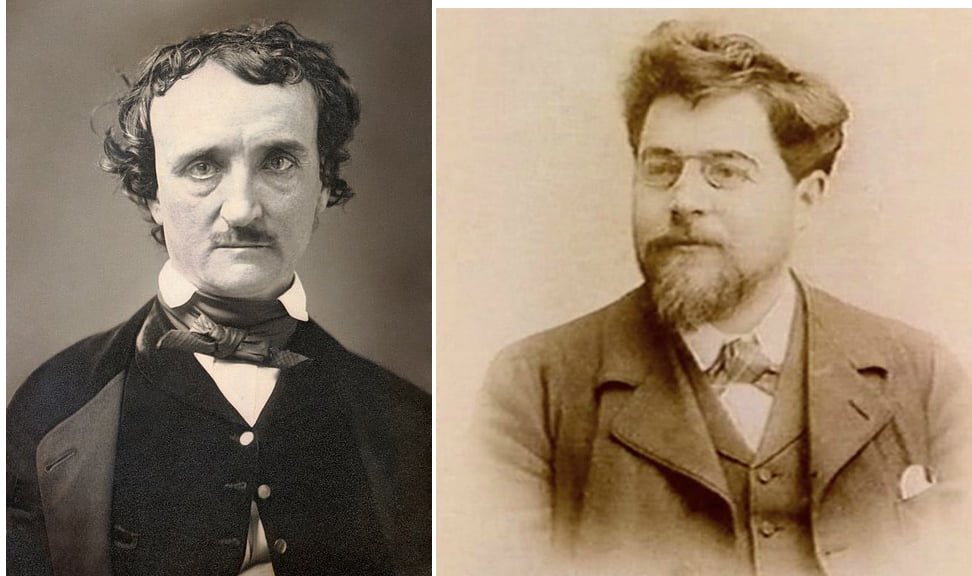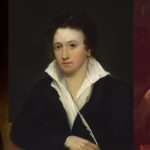
Interviewer: Good evening, once again, to our dear audience. Today, in this program that we have called “What do you think about…?”, we have as guests two notable writers whose great literary work has contributed to the evolution and development of Gothic literature, and detective fiction literature. Ladies and gentlemen, let’s give a warm greeting to Edgar Allan Poe, and Gaston Leroux. (To his guests) Welcome to our programa. How are you?
Gaston Leroux: I’m fine, thank you very much for asking.
Interviewer: And what about you, dear Edgar?
Edgar Allan Poe: Please excuse me. I thought I saw a raven flying inside the studio a few seconds ago.
Interviewer (scared): Did you say a raven…?
Gaston Leroux: Oh! Do not worry. Ignore what Edgar has just said. We already know that he has a certain affection for these creatures. You could even say that he makes them appear. If there is a raven in the studio, it’s probably harmless. I would affirm that the poor bird only wants to be in the company of our dear friend.
Interviewer (with growing panic, and a ridiculous grimace of agony): I understand, of course… But… You see, I’ve always had a great fear of ravens and…
Edgar Allan Poe(To the raven, who finally comes out of hiding): Come here, little bird; come here. That’s it (the raven flies across the studio and stands on Poe’s shoulder with it’s claws). Isn’t it lovely?
Interviewer (hiding behind a chair): Charming… Dear Edgar, you have been an influential writer for the Gothic genre in the 19th century. However, many have accused you of being insane due to the nature of your literary wok. What do you think about this?
Edgar Allan Poe: It’s quite understandable. In fact, “sometimes I’m terrified of my heart; of it’s constant hunger for whatever it is it wants. The way it stops and starts”. However, if I have lost my mind, how important could this be? “Men have called me mad; but the question is not yet settled, whether madness is or is not the loftiest intelligence– whether much that is glorious– whether all that is profound– does not spring from disease of thought– from moods of mind exalted at the expense of the general intellect”.
Interviewer: That’s very interesting.
Gaston Leroux: Dear Edgar, you are not in love, are you?
Edgar Allan Poe: Why do you ask? And, what would be the problem if I actually were in love?
Gaston Leroux: Oh! None, but love can be a dangerous feeling. I once knew a young man who “was madly in love with this precious girl… and for that reason, and for many others, he was capable of committing the most terrible crimes”.
Interviewer: Are you referring to the Phantom of the Opera?
Gaston Leroux: I was not referring to him, but what I have just said describes the above-mentioned perfectly well.
Interviewer: A curious character, in deed.
Gaston Leroux: Yes, quite odd, isn’t it? The novel that I wrote is based on real facts. You’ll see, “the Opera ghost really existed. He was not, as was long believed, a creature of the imagination of the artists, the superstition of the managers, or a product of the absurd and impressionable brains of the young ladies of the ballet, their mothers, the box-keepers, the cloak-room attendants or the concierge. Yes, he existed in flesh and blood, although he assumed the complete appearance of a real phantom; that is to say, of a spectral shade.. “.
Edgar Allan Poe: Excuse me, Gaston, I’ve passed away before you wrote your novel. I regret to say that I am not properly informed about this Phantom of the Opera. I have heard some rumors, at the time, but nothing more.
Gaston Leroux: Don’t worry! I’ll gladly tell you about it.
Interviewer: Tell us, Gaston, a little more about the Phantom of the Opera.
Gaston Leroux: He was an exceptional human being. He “had crossed Europe, and went to complete his strange education as an artist, and illusionist at the very source of art, among the gypsies.” His life was that of an unhappy person, whom was forced to live in complete isolation. However, his passion for music gave him the strength he needed to endure his sorrows; it was his consolation. He could have recovered from the stigma of society if his heart had not set on a woman who could not love him.
Interviewer: Which ends up dragging him to his death.
Gaston Leroux: The end of my novel is an open one. He may have escaped to such a fateful end.
Edgar Allan Poe: Anyway, if that had been the case, let me say so, Gaston, I think it wouldn’t have matter. “The boundaries which divide life from death are at best shadowy and vague. Who shall say where the one ends, and where the other begins?”
Interviewer: It’s an interesting point of view.
Gaston Leroux: Yes, Edgar; it certainly is. To tell the truth, it is a tragic story in every sense. The dramatic component is given not only by the deformation with which he was born, which made him look like a monster, but also by the obsessive nature of the love he professed towards the young singer. Perhaps this last factor was the most decisive for the story to transcend as it did.
Edgar Allan Poe: An obsessive love, you say?
Gaston Leroux: Without a doubt. He was a being who could not live without the object that he loved. “His chest ached as if it had been opened to remove his heart. He felt an atrocious emptiness, a real emptiness that could not be calmed until he could place Cristina’s heart where it had been his own. These are phenomena of a particular psychology that, as it seems, they cannot be understood except by those to whom love has struck that blow which in common language is called a crush“.
Interviewer (with a sudden shaking, and still behind the chair): Dear Edgar, your raven has started flying around the studio again! Stop it!
Edgar Allan Poe: She’s a harmless creature, she won’t do anything. This bird has provided me with such pleasant company during these minutes that I cannot imagine my life without her from now on. There is something… there is something… I wouldn’t know how to explain it.
Gaston Leroux: What do you mean, Egar?
Edgar Allan Poe: I don’t know how to translate it into words. But I think that the most accurate thing would be to say that “there is something in the unselfish and self-sacrificing love of a brute, which goes directly to the heart of him who has had frequent occasion to test the paltry friendship and gossamer fidelity of mere Man”.
Interviewer (frightened): Wonderful! What you say is truly wonderful! But your beloved bird has started to destroy the cables and … No! It can not be! The power has been cut off! Dear Edgar …
Edgar Allan Poe: Drop it, she’s just playing.
Interviewer: But Edgar …! This is a real catastrophe!
Gaston Leroux: Say that to our dear Phantom of the Opera.
Interviewer: Your bird is destroying the studio! Dear listeners, we are obliged to suspend the transmission. We hope you have enjoyed the interview, and we’ll meet again at …
TRANSMISSION INTERRUPTED


